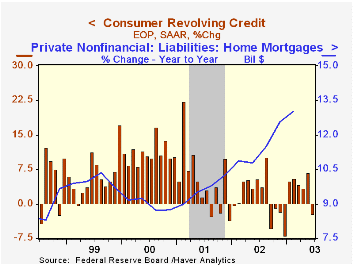 Global| Aug 08 2003
Global| Aug 08 2003Consumer Credit Usage Fell
by:Tom Moeller
|in:Economy in Brief
Summary
The Federal Reserve indicated that consumer credit outstanding (which excludes mortgages) fell $0.4B (-0.2% AR) in June. Consensus expectations had been for a $6.5B rise. The gain in May was revised up due to raised usage of revolving [...]

The Federal Reserve indicated that consumer credit outstanding (which excludes mortgages) fell $0.4B (-0.2% AR) in June. Consensus expectations had been for a $6.5B rise. The gain in May was revised up due to raised usage of revolving credit.
During the first six months of this year, consumer credit usage rose at a 4.1% annual rate.
Nonrevolving credit (which includes auto loans) fell at a 2.2% annual rate in June following a 6.7% gain in May. Year to date, nonrevolving credit usage is up at a 3.8% rate.
Revolving credit rose at a modest 1.1% annual rate in June. That followed a 4.8% May gain.
The more comprehensive flow of funds figures published by the Federal Reserve indicated that through 1Q03, credit market debt owed by the household sector soared 10.3% y/y. That gain was led by a 13.0% y/y gain in outstanding liabilities on homes.
Analysis from the Federal Reserve Bank of San Francisco titled "Financial Development, Productivity, and Economic Growth" can be found here.
| Consumer Credit Outstanding | June m/m | May m/m | Y/Y | 2002 | 2001 | 2000 |
|---|---|---|---|---|---|---|
| Total | $-0.4B | $8.2B | 3.0% | 3.6% | 6.9% | 10.2% |
| Revolving | $-1.3B | $4.0B | 1.8% | 1.5% | 5.1% | 11.6% |
| Nonrevolving | $0.9B | $4.1B | 3.8% | 5.0% | 8.2% | 9.1% |
Tom Moeller
AuthorMore in Author Profile »Prior to joining Haver Analytics in 2000, Mr. Moeller worked as the Economist at Chancellor Capital Management from 1985 to 1999. There, he developed comprehensive economic forecasts and interpreted economic data for equity and fixed income portfolio managers. Also at Chancellor, Mr. Moeller worked as an equity analyst and was responsible for researching and rating companies in the economically sensitive automobile and housing industries for investment in Chancellor’s equity portfolio. Prior to joining Chancellor, Mr. Moeller was an Economist at Citibank from 1979 to 1984. He also analyzed pricing behavior in the metals industry for the Council on Wage and Price Stability in Washington, D.C. In 1999, Mr. Moeller received the award for most accurate forecast from the Forecasters' Club of New York. From 1990 to 1992 he was President of the New York Association for Business Economists. Mr. Moeller earned an M.B.A. in Finance from Fordham University, where he graduated in 1987. He holds a Bachelor of Arts in Economics from George Washington University.
More Economy in Brief
 Global| Feb 05 2026
Global| Feb 05 2026Charts of the Week: Balanced Policy, Resilient Data and AI Narratives
by:Andrew Cates






